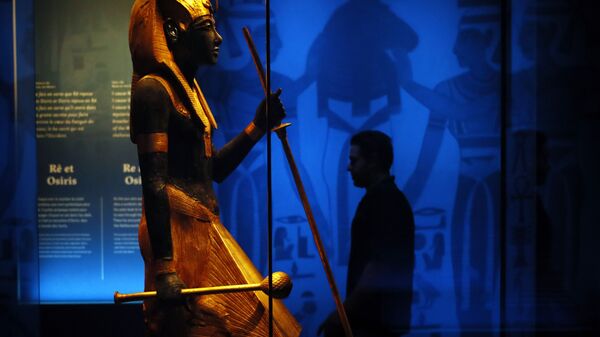Egyptian authorities are indignant over the sale of a stolen bust of Pharaoh Tutankhamun at Christie’s auction house in London, reports The Guardian. The more than 3,000-year-old sculpture shows the boy-pharaoh taking the form of ancient Egyptian god Amen.
The antiquity, which Egypt insists is a cultural treasure looted by tomb raiders, fetched around $6 million. Officials claim that the bust was stolen several decades ago, and requested the auction be cancelled.
Before the auction, Mostafa Waziri, secretary general of Egypt’s supreme council of antiquities, regretted the sale was going ahead, despite protests from government officials and Egypt’s embassy.
“I believe that it was taken out of Egypt illegally ... They have not presented any documents to prove otherwise,” he said, adding Egypt would continue to seek the artefact’s return.
Former antiquities minister Zahi Hawass alleged the bust might have been removed from the temple at Karnak during the 1970s.
Christie's, one of the world’s oldest auction houses denied there was anything improper about the sale, adding there had been no complaints over the years that the artefact had been on display.
“The object is not, and has not been, the subject of an investigation,” said Christie's in a statement, as it gave the auction the go-ahead on 4 July.
According to Christie’s management the bust was “reputedly” owned by German prince Wilhelm von Thurn as far back as the 1960s, and was subsequently sold to a gallery in Vienna, Austria.
However, according to a recent investigation by LiveScience, this information was contested by the prince’s children and a close friend of his, who claim he did not own the piece.
The statue of boy-pharaoh King Tut is not the first dispute between Cairo and London. In 2010, Egypt insisted on the return of the Rosetta Stone, discovered in 1799, key in the deciphering of ancient Egyptian hieroglyphs.
Today the stone, part of a larger slab, lies at the British Museum.
Britain has a long history of controversies involving historical artifacts acquired through a variety of means during its imperial power past.
The Elgin Marbles - Parthenon Sculptures – have long been the subject of debate between the UK and Greece that has sought to bring the treasures home.
Ethiopia lodged a formal complaint about treasures believed to have been stolen from the Ethiopian emperor Tewodros II during the 1868 Battle of Magdala.
The best-known African pieces in the British Museum are the Benin bronzes – intricate metal plaques that decorated the royal palace of Benin but were looted from what is now Nigeria by British troops in 1897.


